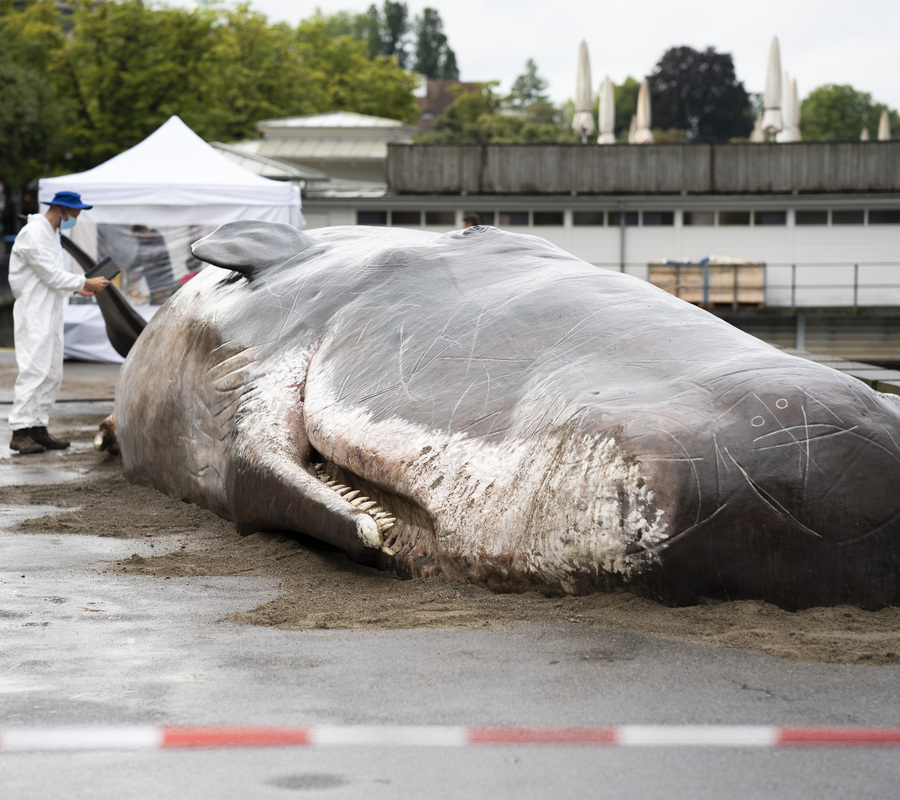

Why do whales beach themselves?
Whale strandings are always very emotional events. We humans sympathize with the gentle giants of the sea and seeing them lifeless on coasts and beaches moves us. Despite rescue networks around the world, a stranding often means death for the animals due to dehydration or because they are crushed by their own weight. But why does it even come to this?
Causes of whale strandings
Reports of mass or individual strandings of certain cetacean species reach us time and again. Mass strandings mainly occur in toothed whales that live in close social groups, such as sperm whales or pilot whales. If one animal in the group becomes stranded, the entire school of whales may be stranded as a result. Baleen whales, however, strand less frequently and tend to strand individually.
There are numerous possible reasons for strandings. They can be of natural origin or the result of human activity. One cause can lead to a whale stranding individually or in combination with others. The exact causes are often difficult to determine and require careful investigation of the circumstances surrounding each stranding and a necropsy of the stranded animals.
Diseases and parasites
As with humans, bacterial or viral infections can also occur in cetaceans and weaken them. Sick animals sometimes seek shelter in shallow waters and can be washed ashore as a result. An infestation by parasites can also impair the whales’ location system and lead to strandings.
Injuries due to ship collisions
The risk of ship collisions increases, especially in busy marine areas such as the Mediterranean. Whales often notice fast ships too late and are not agile enough to take evasive action in time. Unfortunately, collisions with cargo ships or contact with propellers are often fatal, sometimes immediately, but sometimes hours, days or weeks later after suffering agonizingly from the resulting injuries.
Fishing and bycatch
The industrial fishing of our oceans means that the food supply for large marine creatures such as whales is becoming increasingly scarce. Climate change is also contributing to this. The animals have to find new hunting grounds, which involves a great deal of physical exertion. It can therefore happen that emaciated or even starving animals become stranded on the coasts. Whales can also end up as by-catch in fishing nets or become entangled in ghost nets. If they are then severely weakened or injured near the coast, they can wash up on the shore.

Plastic pollution
The increasing pollution of the oceans by plastic has left its mark on even the largest animals. Some mistake plastic objects for food and swallow them. This leads to internal injuries or even death by starvation with an actually full stomach, as plastic is indigestible and blocks the digestive tract.
Intoxication
Chemicals and toxins from industrial activities are regularly released into the surrounding waters and oceans. It also happens that cargo ships leak toxic substances or that oil tankers sink and their cargo spreads as an oil slick on the surface of the water. The sight of intoxicated or oil-covered marine animals on coastlines is unfortunately not uncommon.
Underwater noise
Ships, oil exploration, geological surveys of the seabed and military sonar pollute the oceans with noise. The sound waves can greatly irritate cetaceans, as they themselves also communicate and orient themselves by means of sound. Underwater noise is a relevant cause of strandings due to disorientation, hearing or other tissue damage. Atypical mass stranding of whales is a special form of whale stranding that occurs after considerable exposure to noise from military sonar and very frequently affects Cuvier’s beaked whales. In this case, several animals of one or more whale species strand in a temporal and spatial dispersion and not in the same place as occurs in so-called typical mass strandings.
Natural anomalies in the Earth’s magnetic field
The Earth’s magnetic field appears to be important for the orientation of certain whale species. Changes or anomalies in the magnetic field can cause whales to lose their orientation and end up in dangerously shallow waters, from where they can no longer find a way out and subsequently become stranded.
